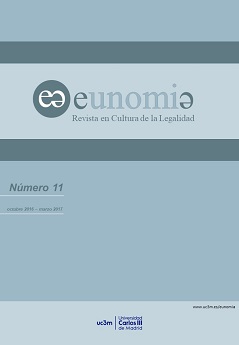Punishment in lawless societies
Abstract
In this work I did a brief reflection about the punishment under contexts where is not possible to guarantee the effectiveness of the legal system. The observance of legal rules implies giving up on certain interests. This renounce happens in a practical frame where we trust that other individuals will also give up on some of their own interests. By doing so, one avoids conflicts and eases the cooperation between the members of the society. Punishment, in this context, represents a motivational technique for those who do not want to suffer it so they behave according to the rules, as well as a support for the victims who have suffered from any damage. Moreover, the punishment is an open institution for moral discussion due to the problems involved, and therefore it demands a justification. A proper justification requires taking into account the consequences of the institution, and this assumes that a punished individual meets the required conditions for the criminal law. To punish when legally due will prevent impunity and punishment of innocents. The impunity in criminal acts and the lack of innocent’s immunity from damage are the negative axes that characterize punishment in an anomic context.
Downloads
Eunomía. Revista en Cultura de la Legalidad is a duly registered journal, with EISSN 2253-6655.
The articles published in Eunomía are –unless indicated otherwise– under a Creative Commons Attribution-No Derivative Works 3.0 Spain license. You can copy, distribute and communicate them publicly as long as you cite their author and the journal and institution that publishes them and do not make derivative works with them. The full license can be consulted at: http://creativecommons.org/licenses/by-nd/3.0/es/deed.es




